(3) Assistance for Security and Stability
Through globalization, the advancement and spread of high-tech devices, as well as the expanded movement of people, transnational organized crime and acts of terrorism have become a threat to the entire global community. In recent years, transnational organized crime, including the illicit trafficking of drugs and firearms, trafficking in persons (Note17), cybercrime, and money laundering (Note18), has become increasingly diversified and sophisticated in its methods. Also, local groups that are affiliated with and influenced by the Islamic State of Iraq and the Levant (ISIL) and other international terrorist organizations are becoming active not only in the Middle East and Africa, but also in the Asian region. Furthermore, homegrown terrorism (Note19) by individuals influenced by violent extremism also poses a grave threat. In addition, piracy and armed robbery against ships off the coast of Somalia and in the Gulf of Aden in eastern Africa, the Gulf of Guinea in western Africa, as well as in the waters of Southeast Asia, are still a concern.
There are limitations for any one nation to effectively deal with transnational organized crime, acts of terrorism, and piracy. Therefore, not only must each nation strengthen its countermeasures, the entire international community must also work together to eliminate legal loopholes through assistance to build capacity in the fields of criminal justice and law enforcement in developing countries.
●Japan’s Efforts
A. Enhancing the Capabilities of Security Authorities
In the area of capacity building of police agencies that constitute a cornerstone in maintaining domestic security, Japan provides assistance focused on the transfer of knowledge and technology based on the track records and experiences of the Japanese police in international cooperation, while emphasizing human resources development, including enhancement of administrative capabilities and systems.
As one example, the National Police Agency (NPA) of Japan dispatches experts to and accepts trainees from mainly Asian countries such as Indonesia, through which Japan teaches how the Japanese police is trusted by the Japanese people as democratically controlled police.
B. Counter-Terrorism
Regions once controlled by ISIL were liberated as a result of clearance operations in Iraq and Syria. However, due to foreign terrorist fighters (FTF) influenced by ISIL returning to their home countries or moving to other countries, the threat of terrorism and violent extremism continues to spread around the world, including Asia.
In March 2019, an unprecedented case occurred in which a terrorist ran livestream video footage of himself shooting people in Christchurch, New Zealand on social media, which quickly spread all around the world. In addition, in April of the same year, there was a terrorist attack in Sri Lanka in which over 250 people, including Japanese nationals, were killed in serial bombings, the largest number of victims in recent years in Asia.
In light of this situation, the outcome documents of the G7 Foreign Ministers’ Meeting and the G7 Interior Ministers’ Meeting, held in Dinar and Paris, France respectively in April 2019, reaffirmed the necessity of combating terrorism and identified specific measures. Moreover, at the G20 Osaka Summit in June 2019, as the G20 Presidency, Japan compiled the G20 Osaka Leaders’ Statement on Preventing Exploitation of the Internet for Terrorism and Violent Extremism Conducive to Terrorism (VECT), which indicates the importance of cooperation among the governments of related countries, international organizations, private companies, and civil society to prevent the exploitation of the internet for terrorism and other related purposes.
Cooperation among countries around the world is essential in combating terrorism, and Japan is providing assistance to enhance the counter-terrorism capacity mainly in Asian countries, so that Asia does not become a loophole in the fight against terrorism. In FY2019, Japan contributed approximately $17 million for border control including support for the enhancement of border administration and counter-terrorism capacity of various countries’ police forces. Japan also contributed approximately $8.2 million toward countermeasures against violent extremism, which is the root cause of terrorism, through the empowerment of women and youth, making Japan’s total contributions approximately $25 million. In particular, Japan focuses on combating violent extremism, which is the root cause of terrorism, through contributions to projects by international organizations and other means. For example, in FY2019, Japan contributed a total of $2.4 million to community support projects for the empowerment of women and youth implemented by UNDP and UN Women, as well as a total of approximately $1.4 million to a project implemented by the United Nations Office on Drugs and Crime (UNODC) to enhance the capacity of staff working in prisons to prevent extremism in prisons and introduce classification techniques based on the risk analysis of inmates.
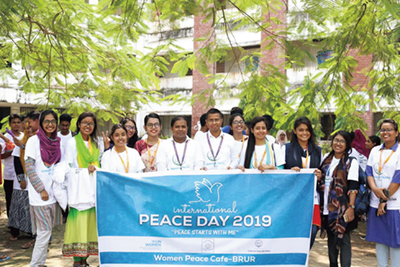
Participants who created a forum, called “Women Peace Café”, and conducted activities on campus of a university in Bangladesh, which aimed for having dialogues to prevent violent extremism, as part of a project implemented by UN Women with contributions from Japan (Photo: BRAC University).
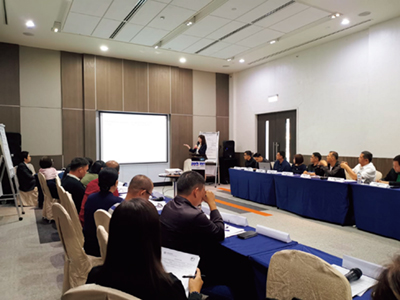
A prison reform support seminar in the Philippines (Photo: UNODC)
C. Measures against Transnational Organized Crime
As globalization advances, the threat of transnational organized crime that is conducted on a large-scale and systematically across different countries is becoming more serious. Transnational organized crime undermines the security of civil society, the rule of law and market economy, which form the foundation of social prosperity and well-being. Thus, transnational organized crime is an issue that needs to be addressed uniformly by the international community. In order to deal with transnational organized crime, Japan, as a state party to the United Nations Convention against Transnational Organized Crime (UNTOC), a legal framework for preventing transnational organized crime including terrorism, is promoting international cooperation that includes investigation assistance based on the Convention. Additionally, Japan mainly provides the following international cooperation.
Measures against Drug Trafficking
Alongside its active participation in international conferences such as the United Nations Commission on Narcotic Drugs (CND), Japan supports counter-narcotics efforts through financial contribution to the UNODC. Specifically, Japan is making efforts to prevent illicit drug trafficking through support for strengthening regulatory capacity in Afghanistan and the neighboring regions, where the narcotics problem is particularly serious, as well as border-control assistance mainly in the Asia region.
In addition, the NPA of Japan invites senior drug investigators mainly from the Asia-Pacific region to attend discussions about the narcotics situation in their countries, narcotics crime investigation methods and international cooperation in the field. It is aimed at establishing and strengthening the international networks on drug enforcement of relevant countries.
Measures against Trafficking in Persons

Instructions on how to make contact with victims etc., as a part of country-focused training for members of the Multi-Disciplinary Team (MDT) of Thailand, through cooperation with Japanese NGOs, under the “Project on Capacity Development on Assisting Victims of Trafficking in the Greater Mekong Sub-regional Countries” (Photo: JICA)
Japan is a state party to the Protocol to Prevent, Suppress and Punish Trafficking in Persons Especially Women and Children, a comprehensive international agreement concerning trafficking in persons. Based on the “2014 Action Plan to Combat Trafficking in Persons” drawn up in 2014, Japan provides various forms of assistance to eradicate trafficking in persons, which is a serious violation of human rights and an extremely malicious crime. Under this Action Plan, the Government of Japan has been publishing annual reports on its efforts to combat trafficking in persons since 2014, while also strengthening cooperation with various ministries, agencies, relevant organizations, and NGOs.
With regard to victims of trafficking in persons protected in Japan, Japan assists in the safe repatriation of them, as well as provides support for the social rehabilitation of these individuals in their home country through means such as education and vocational training, in order to prevent them from becoming victims of trafficking in persons again after repatriation, through contributions to the International Organization for Migration (IOM). Additionally, through its financial contributions to the projects of UN organizations such as UNODC and UN Women, and JICA’s technical cooperation, Japan also contributes to taking measures against trafficking in persons and efforts to protect victims mainly in Southeast Asia. It also makes financial contributions to and participates in the Bali Process, which is an Asia-Pacific regional framework against smuggling and trafficking in persons, and transnational crime.
Measures against Money Laundering
There is a high risk that the profits of transnational organized crime would be used to fund further organized crime or acts of terrorism, and thus, eliminating these flows of illicit funds is an important task for the international community. Therefore, Japan actively participates in discussions on international measures against money laundering and terrorist financing, through intergovernmental frameworks such as the Financial Action Task Force (FATF) established based on the Economic Declaration of the Arch Summit in 1989. Japan also cooperates with UNODC to provide assistance in the area of capacity building, including support for legal system development, to tackle terrorist financing in Iran, Southeast Asia, and other regions.
D. Capacity Building for Maritime, Outer Space, and Cyberspace Issues
The Sea
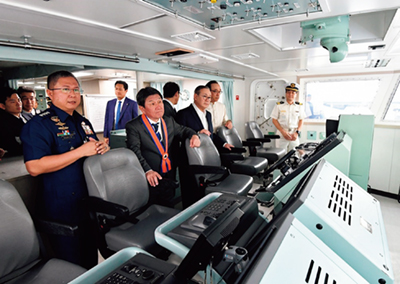
Foreign Minister Motegi visiting on BRP Malabrigo, a patrol vessel constructed with the support of yen loan from the Government of Japan, in the Philippines (January 2020)
As a maritime nation, Japan depends largely on maritime transport for the import of much of its energy resources and food. Thus, ensuring maritime safety is an issue that directly links to Japan’s existence and prosperity as a nation, and furthermore, it is also extremely important for the economic development of the region. However, the threat of piracy exists in the sea lanes between Japan and the Middle East, from which Japan imports large amounts of crude oil, and in the internationally important sea lanes such as off the coast of Somalia, in the Gulf of Aden, and in the Sulu and Celebes Sea. Hence, there is an urgent need to strengthen measures against piracy in these regions.
In Asia, for example, to encourage regional cooperation in the fight against piracy and armed robbery against ships in the region, Japan was at the forefront of efforts to formulate the Regional Cooperation Agreement on Combating Piracy and Armed Robbery against Ships in Asia (ReCAAP). Each of the contracting parties shares information regarding piracy and armed robbery against ships and cooperates via the Information Sharing Centre (ReCAAP-ISC) established in Singapore under the Agreement. Japan supports the activities of ReCAAP-ISC by sending its Executive Director and an assistant director, in addition to the provision of financial support. Since 2017, Japan has been taking the initiative in co-organizing trainings in Japan with ReCAAP-ISC, aimed at building capacity in counter-measures for piracy of maritime law enforcement agencies in ASEAN member states.
Moreover, in order to establish and promote the rule of law at sea, Japan is utilizing tools such as ODA to seamlessly support the improvement of law enforcement capacity of maritime security agencies in the Indo-Pacific region through the provision of patrol vessels, technical cooperation, and human resources development, while promoting international cooperation for the capacity building in Maritime Domain Awareness (MDA) among recipient countries. Specifically, Japan is carrying out human resources development through training and the dispatch of experts for maritime countries along sea lanes including Indonesia and Malaysia, in addition to providing maritime security-related vessels and equipment to Viet Nam, the Philippines, and other countries.
In order to counter the threat of piracy off the coast of Somalia and in the Gulf of Aden in Eastern Africa, Japan has been conducting anti-piracy operations since 2009. Moreover, Japan has contributed a total of $15.1 million to the IMO Djibouti Code of Conduct Trust Fund, which was founded by the International Maritime Organization (IMO) to implement the Djibouti Code of Conduct (a regional framework for Somalia and its neighboring countries). This Trust Fund has been used to establish information-sharing centers for anti-piracy measures and the Djibouti Regional Training Centre, which conducts training programs to improve maritime security capabilities in countries surrounding Somalia. In addition, Japan has contributed a total of $4.5 million to the International Trust Fund (Note20) to support Somalia and its neighboring countries to improve their capabilities in arresting and prosecuting alleged pirates, in order to assist the international community in its measures to counter and prevent piracy and its recurrence. Also, in cooperation with the Japan Coast Guard, training programs for the control of maritime crime have been carried out with the participation of maritime security officers from the countries around Somalia. Furthermore, with the perception that the reconstruction and stability of Somalia are essential for a fundamental solution to the piracy issue in the area, since 2007, Japan has disbursed approximately US$480 million for the restoration of basic social services, improvement of security maintenance capability, and revitalization of domestic industries in Somalia.
Incidents that occur on sea lanes, such as oil leakage from ships, not only have an impact on the safety of ships passing through, but can also cause fatal damage to the fishery and tourism industry of coastal countries by polluting the coast. Hence, it is also important to strengthen the capacity for dealing with such incidents. To that end, Japan dispatches experts (advisors for improving oil spill management capabilities) to Sri Lanka, which is positioned on sea lanes that connect Asia with the Middle East and Africa, to support the strengthening of its capability to manage oil spills at sea.
Furthermore, since 2009, the International Hydrographic Organization (IHO) has been conducting a training program every year in the United Kingdom with the aim of nurturing nautical chart experts in developing countries. This program is carried out with grant assistance from The Nippon Foundation and the participation of the Hydrographic and Oceanographic Department of the Japan Coast Guard in the management of the program. Since its launch, the project has produced 72 graduates from 41 countries. The IHO and Intergovernmental Oceanographic Commission (UNESCO-IOC) are engaged in a joint project to create the General Bathymetric Chart of Oceans (GEBCO), a topographical map of the world’s seafloor. The map has undergone revisions through the cooperation of experts around the world, including the Hydrographic and Oceanographic Department of the Japan Coast Guard. Also, through the grant assistance offered by The Nippon Foundation, a human resource training program aimed at fostering personnel who can contribute to the GEBCO project has been conducted at the University of New Hampshire in the United States every year since 2004. To date, this program has produced 90 graduates from 40 countries.
Outer Space
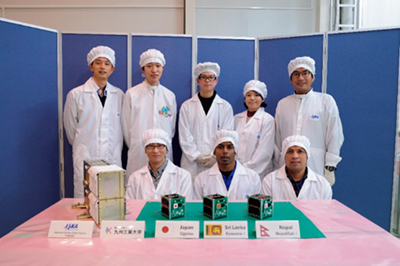
Participants from Japan, Sri Lanka, and Nepal with extremely small satellites developed through the BIRDS-3 mission (Photo: JAXA)
Japan contributes to addressing global issues including climate change, disaster risk reduction, marine/fisheries resource management, forest conservation, and resources/energy through the implementation of development cooperation and capacity-building assistance utilizing space technology. Japan has also proactively provided assistance in the field of human resources development to emerging countries and developing countries in their efforts toward the development and use of space. In particular, initiatives by Japan such as the provision of an experiment environment that makes use of the International Space Station Japanese Experiment Module “Kibo” and the release of small satellites have been highly evaluated. In FY2019, extremely small satellites jointly developed with Nepal, Sri Lanka, and others were released from “Kibo” in June through the BIRDS-3 Project, led by the Japan Aerospace Exploration Agency (JAXA) and the Kyushu Institute of Technology. In addition, in accordance with the agreement concerning the collaboration toward expanding the use of the International Space Station Japanese Experiment Module “Kibo” concluded between the University of Tokyo and JAXA in April 2018, Rwanda’s extremely small satellite “RWASAT-1” was released in September 2019. International cooperation through releasing small satellites from “Kibo” was also mentioned in the Yokohama Plan of Actions 2019, the outcome document of TICAD7. Japan will continue to actively contribute to the capacity building of emerging countries in space development, including African countries.
In addition to these initiatives, in 2016, in order to strategically and effectively offer all-Japan support for capacity building in developing countries in the field of space, Japan formulated basic policies and reported them to the Strategic Headquarters for National Space Policy. Japan continues to actively provide support in line with these policies. For example, in Mozambique and the Democratic Republic of the Congo, Japan has started to provide cooperation toward the implementation of a forest monitoring system utilizing tropical forest monitoring (JICA-JAXA Forest Early Warning System in the Tropics (JJ-FAST)) by “Daichi-2.”
Cyberspace
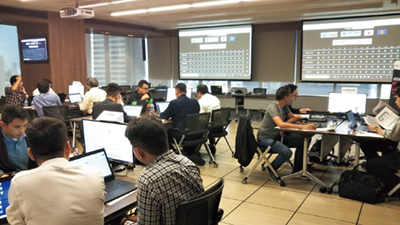
Training conducted at the ASEAN-Japan Cybersecurity Capacity Building Centre
A free, fair and secure cyberspace is a global shared space that enables communication on a global scale, and is the foundation for peace and security of the international community. For that reason, in recent years, it has become a pressing task to take measures against threats to cyberspace. It is thus necessary for diverse actors in each country to work together to respond to these issues. However, the lack of security-related awareness and response capacity in some countries including developing countries poses a significant risk to the entire world including Japan. Furthermore, Japanese people traveling overseas and Japanese companies expanding their business to foreign markets depend on the social infrastructure and cyberspace managed and operated by the host countries. Therefore, strengthening cooperation for ensuring the security of cyberspace in countries around the world and providing capacity-building support to developing countries not only contribute to the recipient countries, but also benefit Japan and the entire world.
Japan participates in the ASEAN-Japan Cybercrime Dialogue held based on the commitment made at the ASEAN-Japan Commemorative Summit in December 2013. The 3rd ASEAN-Japan Cybercrime Dialogue was held in Brunei in January 2019, and Japan introduced its initiatives regarding cybercrime countermeasures. Japan also provides assistance through contributions to cybersecurity-related capacity building projects in Asian countries by international organizations.
In addition, Japan has held the Japan-ASEAN Information Security Policy Meeting since 2009, and carried out cooperative activities toward strengthening mutual understanding and cooperation on cybersecurity policies between Japan and ASEAN as well as resolving common issues. Under this framework, cyber exercises and tabletop exercises have been held with ASEAN member states since FY2013.
Furthermore, Japan has utilized the Japan-ASEAN Integration Fund (JAIF), to which the Government of Japan makes financial contributions, to establish the ASEAN-Japan Cybersecurity Capacity Building Centre in Bangkok, Thailand, as well as provide the Cyber Defense Exercise with Recurrence (CYDER), a practical exercise targeted at cybersecurity personnel of government agencies and critical infrastructure operators in ASEAN countries. Through these efforts, Japan promotes cooperation toward capacity-building in the area of cybersecurity in ASEAN. In 2019, as the first project based on the Japan-ASEAN Technical Cooperation Agreement, it was decided to implement cyber security training for related personnel from ASEAN member states and the ASEAN Secretariat in January 2020.
Moreover, since 2017, Japan has been conducting training for staff engaged in combatting cybercrimes at the People’s Public Security of Viet Nam, with the aim of helping them acquire the knowledge and skills for dealing with cybercrimes, as well as strengthening cooperative relations between the security agencies of Japan and Viet Nam.
Furthermore, from the same year, experts from the Governments of Japan and the United States as well as private companies have been cooperating to implement exercises in Tokyo concerning cybersecurity for industrial control systems in the important infrastructure fields such as electricity and gas, targeting the Indo-Pacific region.
- Note 17: The act of recruitment, transportation, transfer, harboring or receipt of persons for the purpose of exploitation, such as forced labor or prostitution (Article 3 of the Protocol to Prevent, Suppress and Punish Trafficking in Persons Especially Women and Children).
- Note 18: The act of disguising criminal proceeds as legally obtained assets, or the act of hiding such funds. One example is the act in which a drug dealer hides money gained through drug trafficking in a bank account opened under a false name.
- Note 19: Acts of terrorism by those who have grown natively in the country.
- Note 20: From December 2012, the Multi-Partner Trust Fund Office (MPTF Office) took over the management of funds from UNODC.
